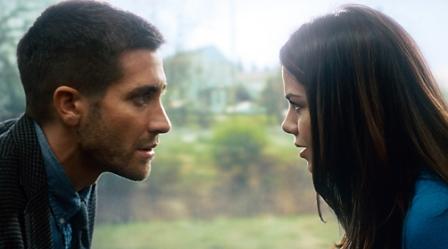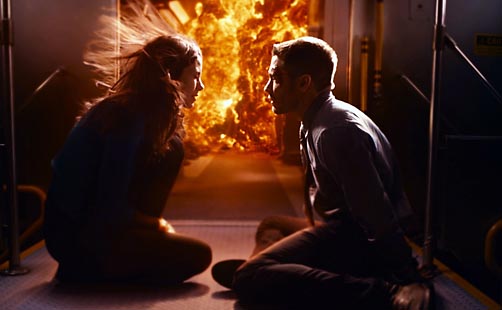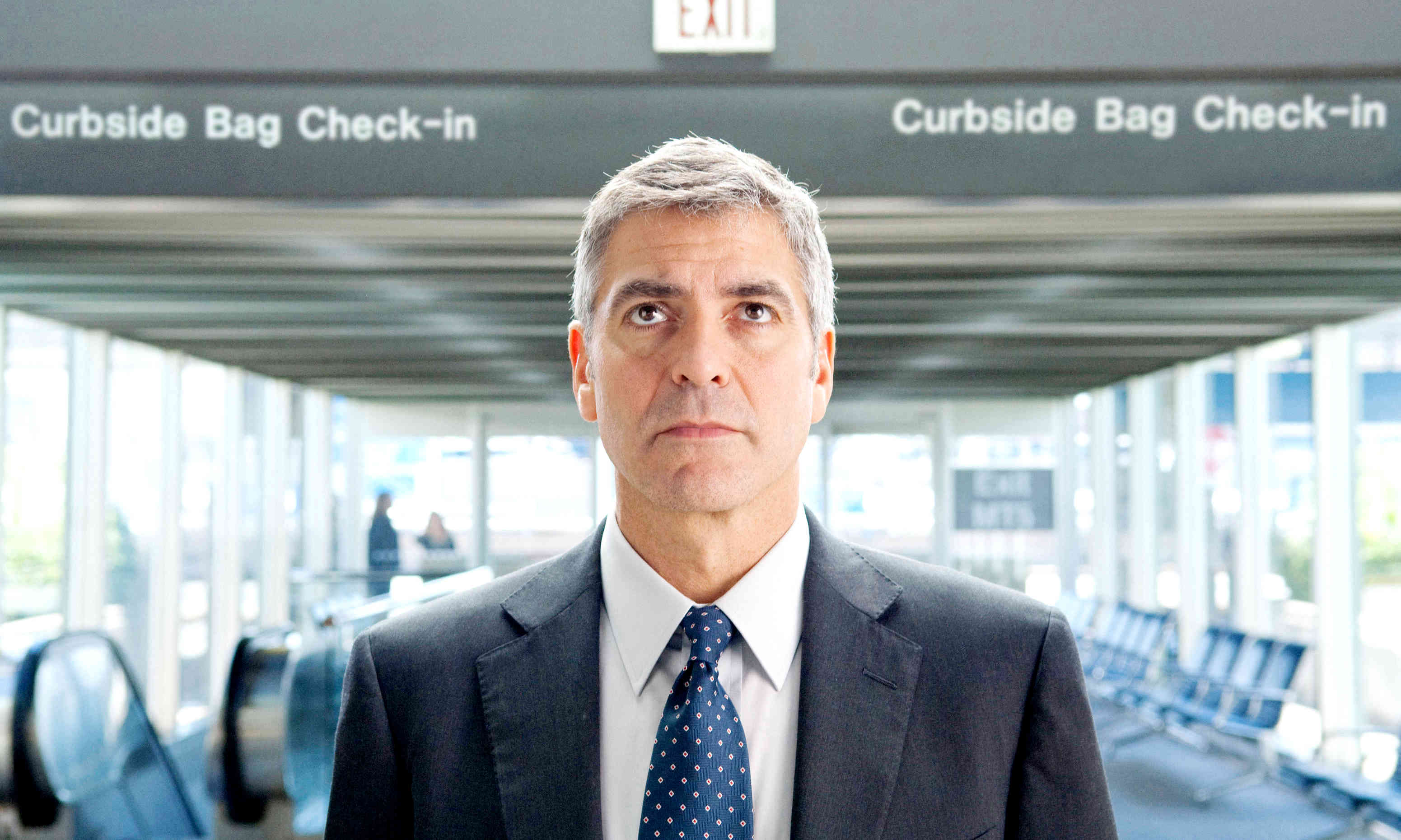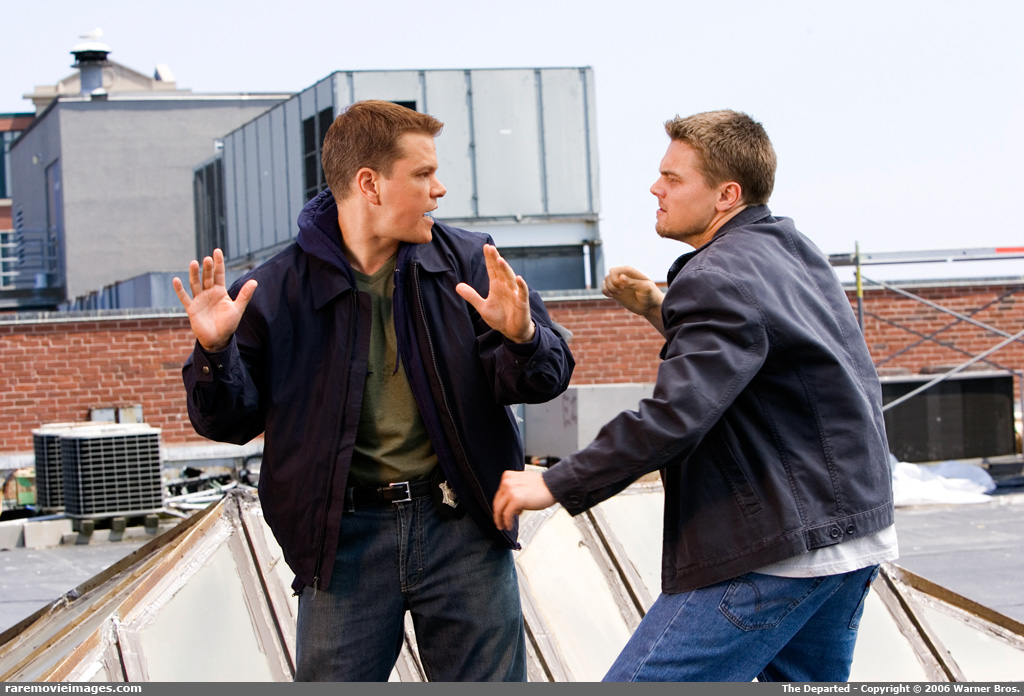
If Hanna was Run Lola Run meets Bourne meets True Grit, then Duncan Jones’ enjoyable B-movie Source Code — another film that has sat in both the viewing and reviewing queues for several weeks — is Groundhog Day meets Deja Vu meets Quantum Leap. Jones’ second film is nowhere near as great or gripping as his heady sci-fi debut, Moon, but it doesn’t really aspire to be either. Instead we have an amiable and breezy popcorn flick that hits at about the level of a quality episode of Amazing Stories, and I mean that as a compliment.
The agreeable, low-key feel of Source Code matches not only its two leads, Jake Gyllenhaal and Michelle Monaghan — both of whom have their usual affable guy/girl-next-door appeal about them here — but also the patron saint of the reliving-the-past-so-we-can-make-it-right genre: Scott Bakula, formerly of Quantum Leap. (He’s here not just in spirit — Bakula also has a voice cameo late in the film. Well-played, Mr. Jones.) And if you enjoyed the time-traveling do-gooderism of Dr. Sam Beckett at all back in the day, you basically know what you’re getting here — A slightly longer and more high-budge episode of the show (alas with no Dean Stockwell — although Vera Farmiga is here, doing a lot of talking to a television screen, and Jeffrey Wright has fun muttering and puttering around in the background as a mad scientist of sorts.)
If for some weird reason you’ve never seen Quantum Leap, the conceit of Source Code is this: Captain Colter Stevens (Gyllenhaal) — a helicopter pilot who thought he was on duty in Afghanistan — wakes up on a train bound for Chicago, sitting across from a comely brunette (Monaghan) who seems to think he’s a teacher named Sean Fentress. Eight minutes later, before he can disentangle what’s happened to him or what’s going on, that train goes boom, killing all aboard. Then Capt. Stevens wakes again to find himself strapped within a futuristic-looking metallic pod, a la Jodie Foster at the end of Contact, with a military handler (Farmiga) trying to ping him over the radio. Most expensive training simulation evar?
Sort of. As the disoriented captain soon discovers, Stevens is actually the Army-donated guinea pig for a new time-traveling technology called (wait for it, wait for it) Source Code, which allows him to relive the last eight minutes of a dead man’s life — but only for informational purposes. In this case, his charge is, a la pretty much every season of 24, to figure out who the bomber of the train is before, in real time, he or she can strike again in downtown Chicago. And so Stevens dives back in, and in again, until he knows exactly when the coffee get spilled and where the gun on board is, all the while developing a closer rappaport with Monaghan. Is it possible he could use Source Code to change the past, rather than just learn from it, and save her life? Be a whole lot cooler if he could…
So, like I said, Quantum Leap — although there’s a lot of Groundhog Day here as well, particularly as Stevens gradually hones his eight-minute runs through trial and error (and learns how to get on the good side of some of his crustier travelmates.) More than anything, tho’, Source Code feels like an exercise in video game logic. Replace the train blowing up with “you have been eaten by a grue,” and for all intent and purposes Stevens is just playing an Infocom game here (or, for the unplugged, reading a Choose Your Own Adventure book.) And so there’s not much sense of danger here in Source Code — The pleasures to be had are less of the will-he-beat-the-ticking-time-bomb variety than of watching someone work out a “Bombing on the Orient Express”-style text-adventure puzzle.
Still, the movie is good fun, not the least since Gyllenhall (who’s already done time as [spoiler] an already-dead time traveler in Donnie Darko) moves along the story at about the pace of the audience: The script is a smart one — Once Stevens understands the ground rules, he runs with it, trying the things that you or I might try to sort his way through the situation.
Now, that being said, the movie’s ending doesn’t make much sense when you think about it. (It’s also unwittingly creepy, in a Being John Malkovich kind of way, if you take time to remember that somewhere before all this started there existed a teacher named Sean Fentriss.) But, hey, it’s a time-travel flick. More often than not, the logic is going to break down at some point regardless. Take it for its B-movie worth and Source Code is a fun, smooth, and involving ride, and a perfectly fine way to spend 90 minutes on a spring or summer day. And if you really like it, you can go ahead and relive it again — just watch out for the grues.




